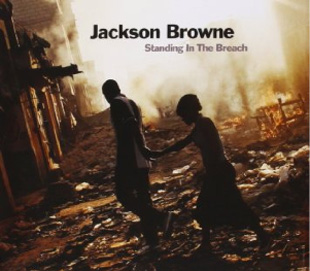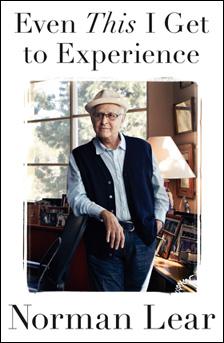![]()
| New World, Timeless Values |
|
![]()
On his deeply felt new folk-rock set, Jackson Browne keeps fighting for freedom and love.
By Anthony DeCurtis in Rolling Stone
Jackson Browne
Standing in the Breach
ROCK (Inside Recordings)


![]() ou don't know why, but you still try/For the world you wish to see," Jackson Browne sings on "Standing in the Breach," the title track to his 14th album of new material and his first in six years. It's a characteristic sentiment, one that reaches back to the Seventies, when Browne distinguished himself as one of America's most visionary and important songwriters. In now-classic songs like "For Everyman," "Running on Empty" and "The Pretender," Browne took a hard look at why the values of the Sixties seemed to die for so many people when that decade passed. Those values -- freedom, compassion, generosity -- remain vibrantly alive for him, and on this superb, inspiring album, he once again stands waiting for everyman: "The change the world needs now," he sings, "is there, in everyone."
ou don't know why, but you still try/For the world you wish to see," Jackson Browne sings on "Standing in the Breach," the title track to his 14th album of new material and his first in six years. It's a characteristic sentiment, one that reaches back to the Seventies, when Browne distinguished himself as one of America's most visionary and important songwriters. In now-classic songs like "For Everyman," "Running on Empty" and "The Pretender," Browne took a hard look at why the values of the Sixties seemed to die for so many people when that decade passed. Those values -- freedom, compassion, generosity -- remain vibrantly alive for him, and on this superb, inspiring album, he once again stands waiting for everyman: "The change the world needs now," he sings, "is there, in everyone."
What's most compelling about Browne is that he understands how greed and destruction in the public world devastate our private lives, rendering love both more necessary and harder to sustain: "It's hard to say which did more ill/Citizens United or the Gulf oil spill." The 10 songs on Standing in the Breach play like conversations between lovers trying to reassure each other of their commitment in a world that devalues human connection of any kind in favor of profit. "You think I'm wishing I was some other place," he sings on "Yeah Yeah," "but in fact I'm right here/With my shoulder to the wheel, baby/And my heart in the deal."
Musically, Browne's signature sound remains country-tinged folk rock, infused with the spare elegance of Protestant hymns. "Leaving Winslow," whose title nods slyly to that famed "corner in Winslow, Arizona" that Browne immortalized with co-writer Glenn Frey in "Take It Easy," propels forward on an infectious rockabilly beat, as does "You Know the Night," set to lyrics by Woody Guthrie. The rocker "If I Could Be Anywhere," featuring keyboardist Benmont Tench and drummer Jim Keltner as guests, beautifully fades out on a dreamlike melody that evokes the more-perfect world Browne believes we still can attain.
At 66, Browne has been an activist long enough to realize that his most firmly held ideals may never achieve fruition. But, like John Lennon, he's enough of an artist to understand that imagining the world as it should be is the first step in bringing that world about. However, the next step -- doing something -- is even more important. "Which side are you on? Browne asks, quoting the old union anthem. There's only one answer as far as he's concerned, and he makes an eloquent case for it on this album. * * * * ![]()

| The Norman Lear Experience |
|
![]()
'70s sitcom mogul Norman Lear's new autobiography is an
entertaining, yet superficial, look back at his long career.
by Jeff Jensen in Entertainment Weekly
Norman Lear
Even This I Get To Experience
MEMOIR

![]() s a kid, Norman Lear, the celebrated television producer who helped nurture the new medium in the '50s and expand its potential in the '70s with a string of bold blockbuster sitcoms (All in the Family, Sanford and Son, and The Jeffersons, to name a few), dreamed of breaking into showbiz as a publicist. After a childhood spent chasing the affection of narcissistic parents and a stint in the Army Air Forces shooting Nazis out of the sky, Lear scored a job as a "pressman" by circulating a cheeky press release full of hype about himself. Now 92, he has done something similar, but much longer: His sharply written, always entertaining, yet surprisingly shallow autobiography Even This I Get to Experience (Penguin, $23.63) is a glowing survey of his important work as an entertainer, liberal activist, and American citizen.
s a kid, Norman Lear, the celebrated television producer who helped nurture the new medium in the '50s and expand its potential in the '70s with a string of bold blockbuster sitcoms (All in the Family, Sanford and Son, and The Jeffersons, to name a few), dreamed of breaking into showbiz as a publicist. After a childhood spent chasing the affection of narcissistic parents and a stint in the Army Air Forces shooting Nazis out of the sky, Lear scored a job as a "pressman" by circulating a cheeky press release full of hype about himself. Now 92, he has done something similar, but much longer: His sharply written, always entertaining, yet surprisingly shallow autobiography Even This I Get to Experience (Penguin, $23.63) is a glowing survey of his important work as an entertainer, liberal activist, and American citizen.
 Lear introduces himself by excavating the childhood hurt that would define his life and inform such characters as Archie Bunker and Maude: his fraught relationship with his father, H.K., charismatic yet callous, a shifty salesman whose dubious schemes and reckless drive to provide yielded chaos for the family and landed him in jail. Lear excels at profiling those who shaped him, from his extended family to his Army buddies to Jerry Lewis and Dean Martin (he made his name in Hollywood writing for them on The Colgate Comedy Hour), and he has a way with choice, juicy anecdotes. The story about Jerry Lewis' penis and a birthday candle is an all-timer. But he doesn't flatter himself with bitter remembrances of his first two marriages. Both were difficult, loveless relationships that left lasting bruises, but his harshness toward his bipolar, suicidal second wife of 30 years, Frances -- mocking her clumsy feminist awakening, resenting her wet-blanket antics during Vegas getaways -- rings graceless.
Lear introduces himself by excavating the childhood hurt that would define his life and inform such characters as Archie Bunker and Maude: his fraught relationship with his father, H.K., charismatic yet callous, a shifty salesman whose dubious schemes and reckless drive to provide yielded chaos for the family and landed him in jail. Lear excels at profiling those who shaped him, from his extended family to his Army buddies to Jerry Lewis and Dean Martin (he made his name in Hollywood writing for them on The Colgate Comedy Hour), and he has a way with choice, juicy anecdotes. The story about Jerry Lewis' penis and a birthday candle is an all-timer. But he doesn't flatter himself with bitter remembrances of his first two marriages. Both were difficult, loveless relationships that left lasting bruises, but his harshness toward his bipolar, suicidal second wife of 30 years, Frances -- mocking her clumsy feminist awakening, resenting her wet-blanket antics during Vegas getaways -- rings graceless.
You keep waiting for Lear to turn his critical eye inward, particularly as his portrait of an ambitious, pill-popping workaholic takes shape. It never really happens. His lack of humility hurts the section of the book that should be the best, his chronicle of his seminal '70s work. The memoir proceeds from the assumption that All in the Family et al. are certifiable Classics That Changed Television -- and they are -- but there is no attempt to assess their relevance today. We get story after heroic story of Lear doing no wrong as TV auteur and provocateur, challenging America to confront social realities, battling network execs who would censor him, humbling difficult stars who would undermine his great work. He responds more defensively than thoughtfully to the lingering criticism that Archie Bunker, lovable bigot, represented a soft, problematic response to prejudice. And he comes off as insensitive if not condescending scolding Esther Rolle and John Amos -- the leads on Good Times, one of the first sitcoms to center on an African-American family -- for stifling the creativity of his mostly white writing staff by constantly worrying about the show's stereotypes, morality and worldview. This from a man who is now so proud of USC's Norman Lear Center, devoted to studying media influence. Lear -- a generous soul, to be sure, with an inspiring passion for his country (the last 100 pages detail his political activism, including launching People for the American Way) -- has produced a wealth of pop culture worth bragging about. His memoir? Not quite one of them. B-
LEAR'S LIFE LESSONS
by Stephen Battaglio in TV Guide
Every innovative producer benefiting from the current creative surge in TV should offer a tip of the porkpie hat to Norman Lear. At 92, the trailblazing producer (All in the Family, The Jeffersons, among many others), entrepreneur, and activist looks back on his life and career in the new memoir Even This I Get to Experience (Penguin Press).
It's surprising to learn you turned down a big movie deal to make All in the Family.
Everybody in my life said, "You're crazy." There was something so personal about All in the Family. Maybe if I had a story to tell at the time that had to be a film, it would have been different.
A lot of people believe we're in a new golden age of TV. Agree?
That's absolutely right. I am now going nuts for [Amazon's] Transparent. Jeffrey Tambor's performance -- oh, my God -- he walks a line between heartbreak and hilarity that is so extraordinary.
Is there a secret to your longevity?
It has a lot to do with living in the moment. There are two small words that are important and mostly overlooked: over and next. When something is over, it's over. Everything is about what comes next.
What comes next for you?
I want to do a Sunday-morning nondenominational service that could be broadcast to tens of thousands of movie theaters -- the way they broadcast the opera now. Keep your religion exactly where it wishes to be, in your heart and soul. But in this service, let's celebrate our common humanity. ![]()
![]() Reader's Comments
Reader's Comments
No comments so far, be the first to comment.
